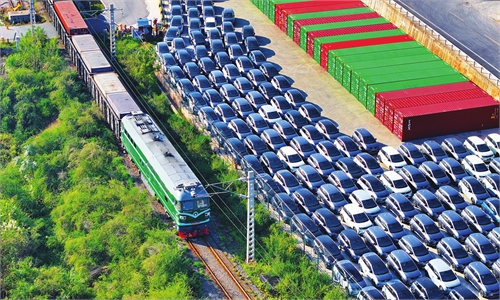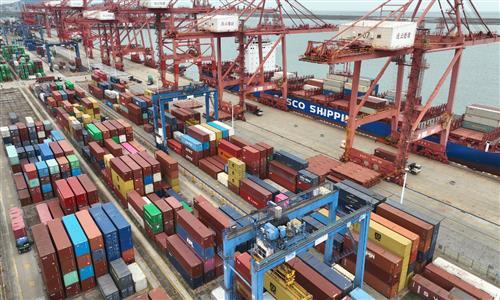Signal from the Central Economic Work Conference is enlightening: Global Times editorial

A view of Lujiazui in Shanghai Photo:VCG
The Central Economic Work Conference was held in Beijing from December 11 to 12. The conference comprehensively reviewed the economic work of 2023, conducted a profound analysis of the current economic situation, and made systematic arrangements for the economic work in 2024. As China's highest-level annual economic conference, the Central Economic Work Conference at the end of each year receives high attention from various parties. Particularly, in the face of various pressures and difficulties both domestically and internationally this year, people are interested in the important signals released during this Central Economic Work Conference and how they will impact the trajectory of the Chinese economy.
The conference first affirmed that China's economy has achieved a recovery, with solid progress made in high-quality development in 2023. It also pointed out that to further revive the economy, China still has to overcome some difficulties and challenges, including lack of effective demand, overcapacity in some sectors, and lackluster social expectations. The conference believed that, overall, favorable conditions outweigh unfavorable factors in China's development. Regarding the economic work next year, the meeting called for efforts to pursue progress while ensuring stability, consolidate stability through progress, and establish the new before abolishing the old. These important judgments not only recognize the advantages and overall momentum of the Chinese economy but also do not dodge specific problems and challenges, which reflects the spirit of pragmatism consistently upheld by the central government. The specific work arrangements are thus targeted and highly practical.
To further promote economic recovery and improvement, expectations and confidence are particularly important. The Central Economic Work Conference has laid a foundation for this confidence. To further strengthen it, the key focus should be on implementation. This conference not only put forward a series of forward-looking, targeted, and feasible work priorities and new reform and opening-up arrangements, but also emphasized the implementation of the central spirit. On one hand, it demands seizing every favorable opportunity, utilizing all favorable conditions, taking prompt action when opportunities arise, doing more when possible, and striving to use the certainty of one's own work to cope with the uncertainty of changing situations. On the other hand, four words and phrases were used to underscore the importance of "implementation": "unwavering," "swift and resolute," "being realistic and pragmatic" and "daring to take positive actions." Once again, there is a strong emphasis on "ensuring that the final results align with the decision-making intentions of the CPC Central Committee" and "resolutely correcting formalism and bureaucratism," among other aspects.
These expressions are thought-provoking, reflecting the high attention paid by the central government to the effectiveness of economic work and serving as a reminder to local governments and departments. In the current stage, it is particularly important to effectively enhance economic vitality, prevent and resolve risks, and improve social expectations. Local governments and departments need to completely, accurately and comprehensively implement the central government's spirit, truly push forward high-quality development, and translate the central government's spirit into tangible and noticeable practical results that the people can experience. At this critical juncture when the Chinese economy is climbing uphill, overcoming formalism and bureaucracy and effectively safeguarding the overall development situation is a key factor in China's economic breakthrough. Local governments, especially, cannot afford to drop the ball in this regard.
China's economy, ranked second in the world in terms of size, has not only maintained its leading growth rate among major economies but also demonstrated vigorous development momentum in areas such as new technologies. More and more emerging industries have taken the lead in the global industry. Anyone who truly understands the overall picture of the Chinese economy, without any malicious ideological bias against China, would find it difficult not to be optimistic about its development prospects. Over the years, China has repeatedly shattered various "collapse theories" from the West through practice. The fundamental reason is that this country does not pursue expansion or engage in geopolitical alliances. Whether domestically or internationally, China wholeheartedly focuses on seeking development.
The 20th CPC National Congress once again reaffirmed that development is the top priority of the Communist Party of China in governing and rejuvenating the country. As this year marks the beginning of fully implementing the spirit of the 20th CPC National Congress, various measures have been introduced by local governments and departments to promote economic development. The Central Economic Work Conference this year proposed that "advancing Chinese modernization must be regarded as the greatest political task. Under the party's unified leadership, we must unite the broadest range of people, focus on the central task of economic construction and the primary task of high-quality development, and gradually turn the grand blueprint of Chinese modernization into a beautiful reality." It is evident that China's determination and strong belief in development have been consistent and continuous, providing the greatest confidence for the country's economic progress. The belief and confidence conveyed in this conference will undoubtedly bring new inspiration to all sectors of Chinese society.


